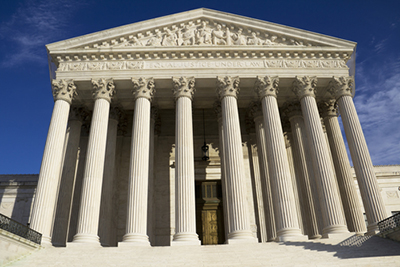
As early as November 30, 2018, the U.S. Supreme Court will decide whether to hear three high profile employment cases that question whether Title VII’s ban on sex discrimination protects gay and transgender employees. These cases have significant implications on the proper scope of Title VII and the rights of the LGBT community in the workplace.
Under Title VII, an employer has engaged in “‘impermissible consideration of … sex … in employment practices’ when ‘sex … was a motivating factor for any employment practice,’ irrespective of whether the employer was also motivated by ‘other factors’.”
The text of Title VII provides, in relevant part:
| It shall be an unlawful employment practice for an employer … to fail or refuse to hire or to discharge … or otherwise to discriminate against any individual with respect to his [or her] compensation, terms, conditions, or privileges of employment, because of such individual’s race, color, religion, sex, or national origin …. | |
42 U.S.C. § 2000e-2(a)(1). In the first of the three cases, Altitude Express v. Zarda, the estate of a deceased Missouri skydiving instructor claims that his former employer unlawfully terminated his employment based on his sexual orientation. In February 2018, the Second Circuit ruled in favor of the deceased employee’s estate finding that the EEOC correctly interpreted Title VII’s ban against sex discrimination to include protection against bias based on sexual orientation. The court concluded that Title VII’s prohibition on sex discrimination applies to any practice in which sex is a motivating factor because (1) “sexual orientation discrimination is a subset of sex discrimination because sexual orientation is defined by one’s sex in relation to the sex of those to whom one is attracted,” (2) “[s]exual orientation discrimination is also based on assumptions or stereotypes about how members of a particular gender should be,” and (3) “[s]exual orientation discrimination is also based on assumptions or stereotypes about how members of a particular gender should be.” The employer has petitioned the Supreme Court to decide whether sexual orientation is indeed covered under Title VII’s ban against sex discrimination.
Illustrating the circuit split on this issue, the petitioner in the second case, Bostock v. Clayton County, Georgia, is appealing a ruling by the Eleventh Circuit that found he did not have a viable cause of action under Title VII for a claim that he was unlawfully terminated because of his sexual orientation. The court relied on prior circuit precedent holding that “[d]ischarge for homosexuality is not prohibited by Title VII.”
Finally, arising from the Sixth Circuit, R.G. & G.R. Harris Funeral Homes Inc. v. EEOC, involves a transgender employee who was terminated from her place of employment shortly after informing her employer of her intent to transition from male to female and to dress in women’s clothing at work. The Sixth Circuit found in favor of the employee, holding that the company engaged in unlawful discrimination on the basis of the employee’s sex in violation of Title VII. The court reasoned that sex stereotyping based on a person’s gender non-conforming behavior is impermissible sex discrimination. The Sixth Circuit also held that discrimination on the basis of transgender and transitioning status violates Title VII because “it is analytically impossible to fire an employee based on that employee’s status as a transgender person without being motivated, at least in part, by the employee’s sex” and “discrimination against transgender persons necessarily implicates Title VII’s proscriptions against sex stereotyping.” The company has petitioned the Supreme Court to decide whether Title VII’s protections also extend to gender identity.
Not only are the circuits split, the Department of Justice and the EEOC are also split on this issue. The DOJ, which also has responsibility for enforcing statutes prohibiting sex discrimination, opposes the EEOC’s position that bias based on sexual orientation or gender identity are covered under the umbrella of Title VII’s ban against sex discrimination. The DOJ filed amicus briefs in Altitude and Harris Funeral Homes arguing respectively that neither sexual orientation nor general identity are part of “the ordinary meaning of ‘sex’.” Based on a Memorandum of Understanding between the DOJ and the EEOC, the EEOC cannot defend a case at the Supreme Court unless the DOJ allows it, but other organizations can proceed on behalf of the employee.
Whether the Court decides to hear these cases and, if it does, how the Court will ultimately rule will have significant ramifications for employers subject to Title VII. We will continue to monitor the Court’s actions in these cases.

